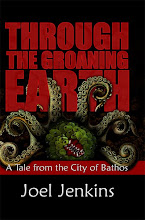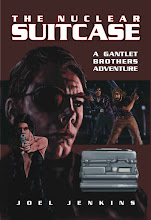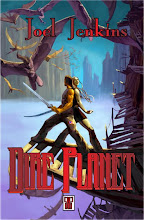Sunday, April 13, 2008
Writing Amoral Characters
Normally, I like my protagonists to have at least some seed of good in them that is trying to grow. However, Willen really doesn't have anything redeemable about his character, except for maybe a dogged determination which one might find kind of admirable--if he were to apply that determination to something worthy, which he doesn't.
Now this kind of character has certainly been experimented upon before by other authors, but anytime a writer attempts a thoroughly rotten character he runs the risk of alienating the readers, because they don't really care what happens to such a rotten fellow.
Many writers will alleviate this problem by giving the rotten protagonist at least one good quality (sure he's a murderer, but he loves his daughter/son) or by finally having the character come to a realization of his rotten ways and resolving to do become a better person (I'm going to give back all that money I stole from the First National Bank!) or by giving them at least one honorable trait. These are all valid methods of making the character more likable, and redemption is always a wonderful character arc if done well.
But Willen, the Butcher of Lantern Street, has no such things going for him. He'd stab his own mother in the back if he thought there was a copper coin in it for him. He'd betray his only friend if there was a profit in it. Will readers not care about the fate of Willen or will they follow the story, fascinated by his wicked ways and wonder if his well-earned demise will follow? I'm hoping the latter.
Sunday, April 6, 2008
Saturday, March 29, 2008
Dark Worlds
I just received notice of the line-up for the first issue of the pulp-style magazine called Dark Worlds, which is a new publishing project put from Mike Jackson and G.W. Thomas (the editor responsible for shepherding Dire Planet to publication at both CyberPulp and Rage Machine Press).
My Novella length story, The Investment, will be one of the two featured novellas. I'm familiar with some of the work of the other authors, and I'm eager to find out what they've put together for this first issue of Dark Worlds magazine.
The Investment follows the employees of Barclay Salvaging as they make a run for a trove of ancient alien technology. With rival salvaging companies trailing them, and a team of intergalactic assassins gunning for them they've trouble enough when they find that the supposedly uninhabited planet on which they've crash-landed is occupied by something far more sinister than all the other forces aligned against them.The Dark Worlds line-up is listed below. I'll keep you updated and be sure to let you know when Dark Worlds comes off the presses.
Dark Worlds, Issue #1 line-up:
Novellas:
IN THE SERVICE OF THE ALL FATHER C. J. Burch
THE INVESTMENT Joel Jenkins
Short Stories:
RED ENGINE Bret Tallman
FIFTEEN MINUTES David Bain
HELLER G. W. Thomas
THE REVENGE OF CTHULHU J. F. Gonzalez
EYE, URREAL Robert Burke Richardson
Articles:
INTERVIEW WITH JUSTIN GUSTAINIS/Review of Black Magic Woman
THE DARK WORLDS CLUB
Wednesday, March 26, 2008
Wednesday, March 19, 2008
New Addition
Monday, March 10, 2008
The Obscure Works of Joel Jenkins, Part 1

My first professionally published piece of fiction was a novella called Black Circle Storm which saw print as the cover story of the short-lived Adventure Mystery Magazine by Hidalgo Press. Pulp fiction fans might recognize Hidalgo as the company name inscribed on Doc Savage's warehouse where he kept various planes and gyrocopters stashed, and indeed, Mark Lambert, the editor of Adventure Mystery Magazine, is fan enough of Doc Savage to have written a book about Lester Dent, the author of the Doc Savage stories.
The description of Black Circle Storm taken from inside the magazine is as follows:
Michael and Candice Thunder travel Down-Under for the auto race of their lives, which turns into a race for their lives! Racing action, political intrigue, and a villain with incredible power. What is the Black Circle and why does it want the Thunders dead?
I like to think that Black Circle Storm still holds up as a pretty decent yarn and I've got a sequel novella that hasn't yet seen print--maybe sometime in the future it would be nice to see these both published together.
In the meantime, where would one look for a copy of Adventure Mystery Magazine? I'm not so sure... Amazon has one copy listed for $40.00. There's bound to be a few others circulating, but I'm not sure where.
Sunday, March 2, 2008
Eccentric Book Store Owners
My story tells of a book store from Washington State and of an owner with a much milder temperament—but perhaps equally eccentric, and with a mania for collecting that would prove to be his downfall.
Gary's Comics and Collectibles resided off Hewitt in old Everett and provided the widest selection of new and old comic books and science fiction and fantasy books within a hundred miles. The shop was kept mostly organized by a small handful of dedicated employees, who tried valiantly to keep the comic boxes from getting double stacked on the display tables. However, Gary haunted swap meets and often came back with more goods than he sold and eventually they rented the space next-door so they could spread out the ever-growing inventory.
This expansion continued when some other enterprising businessman had the temerity to open up a comic book shop only three blocks away on Colby. To express his displeasure, Gary rented a third space, this one directly across the street from his nemesis' comic book shop and appropriately named the store NEMESIS.
What Gary's business rival lacked in inventory it made up for in organization. Looking for back issues at Gary's usually required the direction of an employee and fifteen minutes of digging. At the rival comic book store one only had to look behind the new issue on the rack to find 6 to 12 months worth of back issues. However, if you a person wanted to find the really good stuff, the really old stuff, the really rare stuff you needed to block out several hours to search through the boxes at Gary's—a store which was becoming increasingly cluttered and disorganized as Gary continued to acquire inventory and as they suffered from employee troubles.
Eventually Nemesis closed its door; it turned out that Everett's economy couldn't support three comic book stores within three square blocks. This wasn't surprising to most outside observers; the decision to open a store directly across the street from a rival seemed more an emotional one than a carefully weighed economic-based decision.
It didn't seem like long after that when Gary was no longer able to rent two adjacent slots and moved around the corner to a double story building. The plan was that the second story would initially be storage, and then they would get it organized and open it up to the public. That never happened—and the piles of books, comic books, toys (1,000 Mcdonald 101 Dalmation toys, anyone?) began to grow.
Going to Gary's was like a treasure hunt. You didn't quite need to bring a shovel but you knew you were going to get dusty and grimy. Sometimes the treasure hunt was fruitless, but sometimes you'd come away with rare treasures. It was at Gary's that I filled out and completed my collection of Edgar Rice Burroughs and Robert E. Howard books. Also, I filled in large corners of my Kenneth Robeson Doc Savage paperback collection.
However, it was becoming more and more difficult to locate anything. When the entire city block was demolished to make way for an events center and ice rink for a local semi-pro hockey team Gary moved his shop into a niche behind a paint shop on Broadway. Last time I dropped by stacks of books, and comic books towered over my head, tottering and leaning as I squeezed through the aisles, stepping over boxes filled with toys and games. Any misstep might result in an avalanche from which it would require a crew of rescue workers to dig me out. The entire aisle to the new comic book releases was blocked off and I asked how I could get to them.
“We stopped ordering new books about six months ago,” said Gary. He launched into a long diatribe against the comic book distributors and his former employees—especially one who had taken him for thousands of dollars during the Magic Card and comic book boom of the eighties. He blamed all the financial woes of the last 25 years on this one unscrupulous fellow.
Then Gary went on to bemoan the fact that he had several storage units full of other goods, which he was hoping to redeem from hock as soon as he sold a rare piece of World War II Navy memorabilia. I looked around at the mountains of merchandise that would never be sold because no one would be able to find anything, and I wondered if maybe he shouldn't concentrate on selling the stock that he had in the store.
As if to reinforce the point I had made in my head, Gary resumed complaining. “The Landlord is whining about the boxes stacked in the hall behind the store."



























